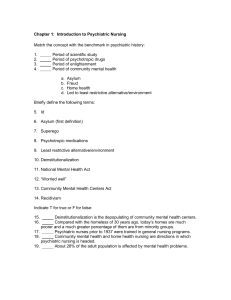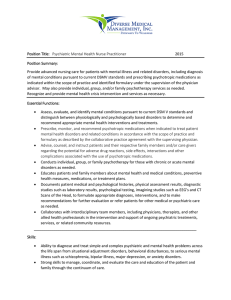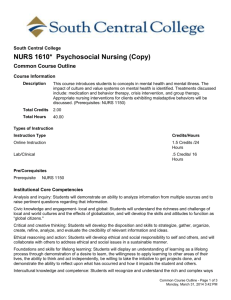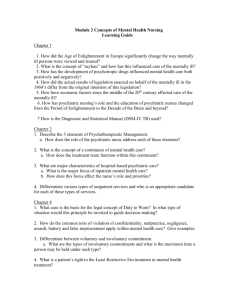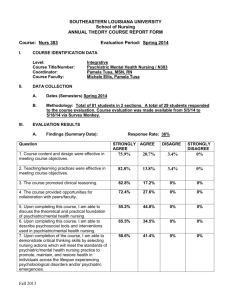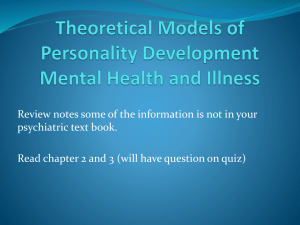N212: Health Differences Across the life span 2 Chapter 1 & 2
advertisement
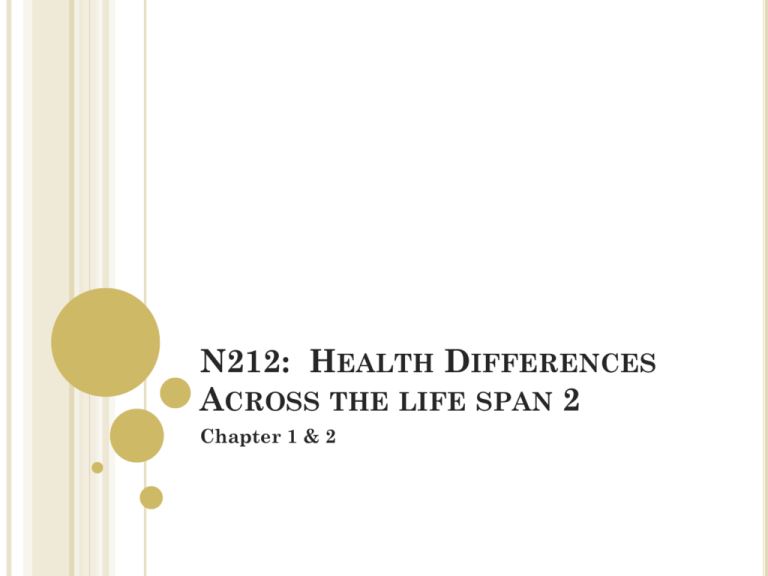
N212: HEALTH DIFFERENCES ACROSS THE LIFE SPAN 2 Chapter 1 & 2 CHAPTER 1: THEORETICAL CONCEPTS: OBJECTIVES Differentiate between mental health and mental illness. Understand and describe psychobiological disorders. Gain knowledge of the DSM-IV-TR. Understand major personality theories and the people who developed them. Acquire knowledge about the biological basis for understanding psychotropic drugs. Describe the main therapeutic modalities and the specific drugs used: psychotropic drugs, antipsychotic, mood stabilizers, antianxiety/ anxiolytic drugs, ADHD treatments, and Alzheimer’s treatments. Gain understanding of mental health nursing in community settings. Develop a mental health assessment plan. Learn how to develop a therapeutic relationship. Acquire information about clinical interviews and communication skills. Understand key terminology and concepts. THEORETICAL CONCEPTS Mental Health Mental Illness Psychobiological Disorders Behavioral Response Affective Response Anxiety Response Mood Disorders Altered Thought Processes Aggressive Responses THEORETICAL CONCEPTS DSM-IV-TR Axes Culture THEORIES OF PERSONALITY Sigmund Freud Erik Erikson Harry Stack Sullivan Hildegard Peplau Jean Piaget Abraham Maslow Lawrence Kohlberg Gerald Caplan BIOLOGICAL BASIS FOR UNDERSTANDING PSYCHOTROPIC DRUGS Functions of the brain Neurons Neurotransmitters Organization of the nervous system Causes of mental dysfunction THERAPEUTIC MEDICATIONS Psychotropic drugs Antipsychotic drugs Mood stabilizing drugs Antianxiety/Anxiolytic drugs Treatment of ADHD Treatment of Alzheimer’s disease MENTAL HEALTH NURSING IN ACUTE CARE SETTINGS Goals of inpatient psychiatric treatment The health care team Components of inpatient care MENTAL HEALTH NURSING IN COMMUNITY SETTINGS Foundations of community psychiatric nursing Biopsychosocial nursing assessment Inpatient versus community-based settings Community-based resources: goals and services Ethical issues ASSESSMENT Mental status exam & psychosocial status assessment Assessment of the elderly Outcome criteria Implementation Evaluation Documentation DEVELOPING THERAPEUTIC RELATIONSHIPS Goals Types of relationships Characteristics that promote growth and change in others Boundaries Values clarification Phases of the nurse-client relationship Factors that help or hinder the nurse-client relationship CLINICAL INTERVIEWS AND COMMUNICATIONS SKILLS Clinical supervision Berlo’s communication model Verbal and nonverbal communication Cultural communication barriers Effective communication skills Blocks to communication CHAPTER 2: LEGAL AND ETHICAL ISSUES: OBJECTIVES Become familiar with the ANA Code of Ethics. Gain knowledge about Patients’ Bill of Rights. Understand admission, commitment, and discharge procedures. Acquire knowledge about the Community Health Centers Act of 1963. Learn about intentional torts and their consequences. Be able to list and describe the Standards of Care as enumerated by the ANA Code of Ethics. Understand documentation of care in the psychiatric setting. Gain knowledge about the ethical and legal implications regarding confidentiality in psychiatric nursing. Be able to list and describe the procedures and rationale for reporting child and elder abuse. Understand key terms and concepts. ETHICAL CONCEPTS Considerations and dilemmas Ethics terminology ANA Code of Ethics Patients’ Bill of Rights Admission, commitment, and discharge Community Health Centers Act (CMHC) of 1963 Client Rights Intentional tort Legal terms in psychiatric nursing ETHICAL CONCEPTS Standards of care Documentation of care Confidentiality Reporting child and elder abuse
